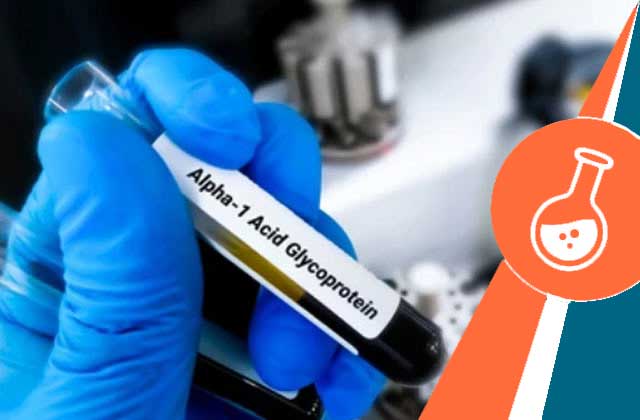Alpha-1-Acid Glycoprotein and its Function
Alpha-1-acid glycoprotein (AGP), also known as orosomucoid, is a glycoprotein produced by the liver and secreted into the bloodstream. It is a part of the acute-phase reactants, a group of proteins that increase in concentration during inflammation or infection. AGP is involved in various physiological processes and has several functions in the body.
Conditions that may require Alpha-1-Acid Glycoprotein Test
The alpha-1-acid glycoprotein (AGP) test, also known as the orosomucoid test, is not routinely ordered or used as a specific diagnostic test for a particular condition. However, there are certain situations or medical conditions where the AGP test may be used to provide additional information. These include:
- Inflammatory Disorders: AGP levels can increase during inflammatory conditions, such as rheumatoid arthritis, systemic lupus erythematosus (SLE), inflammatory bowel disease (IBD), or certain infections. Monitoring AGP levels may help assess the severity or progression of these conditions.
- Monitoring Response to Treatment: In some cases, AGP levels can be monitored to assess the response to treatment in inflammatory diseases. A decrease in AGP levels over time may indicate a positive response to therapy.
- Cancer: AGP levels can be elevated in certain types of cancer, such as hepatocellular carcinoma (a form of liver cancer) and pancreatic cancer. Monitoring AGP levels may be used in the diagnosis, staging, or monitoring of these malignancies.
- Drug Interactions: AGP is a carrier protein that binds to various drugs in the blood. Changes in AGP levels can affect the pharmacokinetics and efficacy of certain medications. Measuring AGP levels may be useful in determining the optimal dosage or assessing drug-drug interactions for drugs that bind to AGP.
- Acute-phase Reactants: AGP is one of the acute-phase reactants, a group of proteins that increase in response to inflammation or infection. Monitoring AGP levels, along with other acute-phase reactants, can provide a comprehensive picture of the inflammatory status in certain conditions.
Alpha-1-Acid Glycoprotein Test Procedure
The Alpha-1-Acid Glycoprotein test is performed by drawing a blood sample from a vein in your arm. Our phlebotomist, will clean the site with an antiseptic and apply a tourniquet to make the veins more visible. He will then insert a sterile needle into a vein and collect the required amount of blood into a collection tube.
Interpreting Alpha-1-Acid Glycoprotein Test Results
- Normal Range: The laboratory conducting the test will provide a reference range for AGP levels. Results within this reference range are typically considered normal for the population being tested.
- Inflammatory Conditions: AGP levels can increase during inflammatory conditions, such as rheumatoid arthritis, systemic lupus erythematosus (SLE), inflammatory bowel disease (IBD), or certain infections. Elevated AGP levels may indicate the presence of inflammation or the severity of the inflammatory process.
- Cancer: In certain types of cancer, such as hepatocellular carcinoma or pancreatic cancer, AGP levels can be elevated. Monitoring AGP levels may be used in the diagnosis, staging, or monitoring of these malignancies.
- Drug Interactions: AGP is a carrier protein that binds to various drugs in the blood. Changes in AGP levels can affect the pharmacokinetics and efficacy of certain medications. Measuring AGP levels may be useful in determining the optimal dosage or assessing drug-drug interactions for drugs that bind to AGP.
- Individual Variations: AGP levels can vary among individuals, and the interpretation of the test results should be made in the context of the individual’s specific clinical presentation and other relevant factors.
Treatment for High Alpha-1-Acid Glycoprotein levels
The treatment for high alpha-1-acid glycoprotein (AGP) levels depends on the underlying cause of the elevation. AGP levels can increase in various conditions, including inflammatory disorders, infections, certain cancers, and drug interactions. Therefore, the treatment approach will be directed at managing the specific condition that is causing the elevated AGP levels. Here are some general considerations:
- Address the Underlying Condition: If high AGP levels are due to an underlying inflammatory condition, such as rheumatoid arthritis or inflammatory bowel disease, treatment will focus on managing and controlling the inflammation. This may involve medications such as nonsteroidal anti-inflammatory drugs (NSAIDs), corticosteroids, disease-modifying antirheumatic drugs (DMARDs), or biologic agents, depending on the specific condition and its severity.
- Infection Management: If elevated AGP levels are associated with an infection, appropriate treatment will depend on the type and location of the infection. Antibiotics, antiviral medications, or antifungal agents may be prescribed to address the underlying infection and bring AGP levels back to normal.
- Cancer Treatment: In cases where high AGP levels are linked to certain types of cancer, the treatment plan will be based on the specific cancer diagnosis, stage, and individual factors. Treatment options may include surgery, chemotherapy, radiation therapy, targeted therapies, or immunotherapy, among others.
- Medication Adjustment: If elevated AGP levels are a result of medication use, particularly drugs that bind to AGP, the treatment approach may involve adjusting the dosage or considering alternative medications that have less impact on AGP levels.
More Related Tests
Why To Book with HealthCareOnTime

17 Crores+ Samples Processed

World Class Technology Labs

25+ Years of Trust & Experience

Free Home Collection
FAQs Around Alpha-1-Acid Glycoprotein
How much does Alpha-1-Acid Glycoprotein Test cost?
The Alpha-1-Acid Glycoprotein Test cost is Rs.750, although it is now available for Rs.585 because of the offer.










